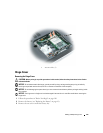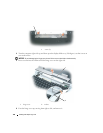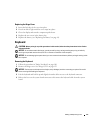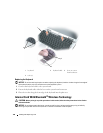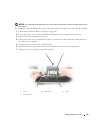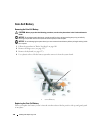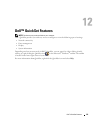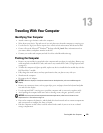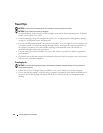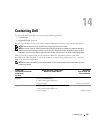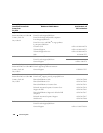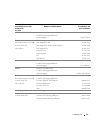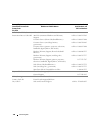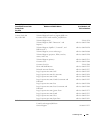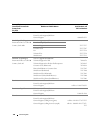
Traveling With Your Computer 133
Traveling With Your Computer
Identifying Your Computer
• Attach a name tag or business card to the computer.
• Write down your Service Tag and store it in a safe place away from the computer or carrying case
• Use the Service Tag if you need to report a loss or theft to law enforcement officials and to Dell.
• Create a file on the Microsoft
®
Windows
®
desktop called
if_found
. Place information such as
your name, address, and phone number in this file.
• Contact your credit card company and ask if it offers coded identification tags.
Packing the Computer
• Remove any external devices attached to the computer and store them in a safe place. Remove any
cables attached to installed PC Cards, and remove any extended PC Cards ("Using ExpressCards"
on page 65).
• To make the computer as light as possible, replace any devices installed in the module bay with the
Dell TravelLite™ module.
• Fully charge the main battery and any spare batteries that you plan to carry with you.
• Shut down the computer.
• Disconnect the AC adapter.
NOTICE: When the display is closed, extraneous items on the keyboard or palm rest could damage the
display.
• Remove any extraneous items, such as paper clips, pens, and paper, from the keyboard and palm
rest and close the display.
• Use the optional Dell™ carrying case to pack the computer and its accessories together safely.
• Avoid packing the computer with items such as shaving cream, colognes, perfumes, or food.
NOTICE: If the computer has been exposed to extreme temperatures, allow it to acclimate to room
temperature for 1 hour before turning it on.
• Protect the computer, the batteries, and the hard drive from hazards such as extreme temperatures
and overexposure to sunlight, dirt, dust, or liquids.
• Pack the computer so that it does not slide around in the trunk of your car or in an overhead
storage compartment.



